- Home
- Iris Murdoch
An Accidental Man Page 3
An Accidental Man Read online
Page 3
‘Do you think you’ll get the Oxford thing?’
‘Gee, I hope so. I try not to think about it. It matters so much.’
‘I’d like to live in Oxford. It’s such a pretty place. And you can get into the country.’
‘You won’t mind being the wife of a stuffy old ancient history don?’
‘Don’t be absurd, Ludwig. Do you think I want to marry an astronaut or something? I only wish I wasn’t such an ignoramus. I’ll just have to keep quiet and smile. I suppose there are wives like that in Oxford. Still the rest of the family will make a show. Papa was a Senior Wrangler and mama was at Bedford and of course Patrick —’
Anxiety about the Oxford job had contributed to his torment, he wanted that job so dreadfully. Oxford had in these months grown huge and wide and magnetic in his consciousness. This too was a kind of being in love. He pictured himself there like a man picturing paradise. He feared disappointment like a man fearing hell. Of course whatever happened now he would stay on in England after his London scholarship year was over. Athena had here sufficiently seized him by the locks. All the elements of his case were clear to him and he had no more doubt about the rightness of his decision. The war was a piece of absolute wickedness in which he would take no part. He would not fight for the United States of America in that war. But neither was it his task to make politics, to shout and speechify and martyr himself. I am not a political animal, he told himself repeatedly. He was a scholar. He would not waste his talents. He would stay in England, where by a pure and felicitous accident he had been born, and take part in the long old conversation of Europe. To regret that his role was in so many ways an easy one was purely sentimental.
The analysis was clear and the decision was made. Only his protestant conscience, like a huge primitive clumsy processing machine, obsolete yet still operational, continued to give him trouble. If only he could take that awful uncomprehending misery away from his parents. He dreaded their letters in which, in language which both offended and touched him, they begged him to come home and get himself ‘straightened out’. Did they really think he must be mad? He dreaded their confused reproaches, their fear. Old European terrors, inherited from generations of wandering ancestors, coursed in their blood and made them shudder from breaking the laws of the United States and evading its decrees. And there was their dreadful wrong-headed pride. Grief at his absence, fear of bureaucracy, what the neighbours thought, it was all jumbled together.
His father’s family were devout protestants from Alsace. His mother’s family were Lutherans from Bavaria. His maternal grandfather, who disappeared during the war and was thought to have died in a concentration camp, had been a minister. A strong and rigid disapproval of Hitler had led both families to migrate westward, and Ludwig’s parents had met soon after the war in Mont-de-Marson where Ludwig’s father had been working as an electrical engineer. They soon decided to emigrate to America, but while waiting for their visas went first on a brief visit to England so as to improve their English. Here, with what now seemed an intelligent prescience, young Ludwig had achieved an English birth, and with it the right to British nationality, although before his first birthday he was already in the U.S.A. He grew up happily enough, normally enough, as an American child, his parents’ joy. Yet in his blood too old European things lived and waited, and as he became an adult and an intellectual he found himself an unidentified person, a changeling. He inherited the physical awkwardness of his parents and their deep conscientious anxiety. He grew up into problems which they had hoped to leave behind. He was uneasy with his hybrid name. He felt ashamed of being an Aryan German and yet also ashamed of having ceased to be one. His parents, perfectly bilingual in French and German, spoke only English at home, laboriously conversing even when they were alone together in this language which they never fully mastered. Ludwig learnt his French and German at school. His parents were grateful to America, and the glow of that gratitude was shed over his childhood.
When he came at last to Europe no blood relations awaited him. All had died or scattered. What mainly confronted him was the ghost of Hitler. This and many other things needed to be exorcized. As a historian and as a man he needed somehow in thought to undergo the whole passion of recent history, but he could not do it. Faced with what he had so significantly missed, his intellect became hazy and faint. He remained outside it all and yet burdened by it as by something heavy forever trailing behind him, a part of himself which he could never properly see. In America he felt European, in France he felt German, in Germany American. Only in England, which he found in some ways most alien of all, could he somehow forget or postpone the problem of who he was. The company of other historians suited him, Oxford and Cambridge scholars, jokey unexcited men who just took him for granted and assumed quietly that of course he would stay and become British. He was so grateful for that.
There will be a time, he thought, beyond all this, when I shall work calmly on remote important things, and when all this anguish will be over. Meanwhile he knew, engaging his conscience with his reason as if these were independent sovereigns, that he did not feel guilty only because he was disappointing his parents. He felt guilty exactly as they did because he was disappointing the U.S.A., because he was breaking the law, because he had decided not to return, because he feared death and would not be a soldier, because he was behaving as cowards and traitors behave. He accepted the guilt with a kind of calm as if it were not an admonition but a mere phenomenon, an experience, a punishment: a punishment for what was happening right now in the little white house in Vermont where his parents brooded over the incomprehensible doom which their son had pronounced.
The decision was made, completed like a long journey, but still strange to him, and rediscovered every morning with a painful lurid surprise. Of course it was no accident that he had mismanaged the whole thing so horribly. This particular muddle he recognized as, for himself, characteristic. If he had elected to be British much earlier he would never have been drafted. He had, he bitterly put it to himself, hoped to get away with it, hoped to have without drama the best of both his worlds. His drafting had been deferred and deferred again. He had thought and thought but without ever quite bringing himself to make up his mind. There was so much involved, so much at stake. He knew he could stick if he had to, and also he knew himself as in some ways an instinctively timid man, a quiet man who was unwilling to raise his voice, unwilling to be stared at. The final summons came unexpectedly. And now he could not defy it with impunity. As far as the United States was concerned he was in bad trouble. Scurrying now for the bolt hole of another nationality would not save him from the automatic retribution of the country which he was so precipitately abandoning. This aspect of the matter, once he did decide to stick, he deliberately refrained from examining in detail. It seemed that at least fifteen years must pass before he could return without facing immediate arrest. With his claim for British nationality pending it was, he had been advised, unthinkable that he should be extradited as a deserter. But as an American he was now done for.
How much, apart from his distress for his parents, this would really hurt, he had not yet been able to estimate. He was quite certain that he was acting rightly. But this did not make it burn less. He suffered his pangs of guilt and fear and loss and waited for these sufferings to pass. There would be a time for reconciliation and quiet work and the treasure caves of Europe, a time, oh God, for Gracie. He had told her these things, but only in a cool and abstract way. He did not know whether he was glad or sorry that she had accepted them without puzzlement, without profound questioning. With how much of the real tangle and torment would it be fair to burden her; and if he was to marry her would it be right to burden her with less than all?
Her little strong right hand was gripping his. ‘What a pity Patrick is too old to be a page.’
‘A page? Oh sure. I can’t see Patrick as a page! I hope he’ll approve?’
‘Oh yes,’ said Gracie, licking her fingers and still hol
ding his hand, so that he felt her tongue on his palm. ‘He said you were the only genuine intellectual among my swains.’
Patrick was Gracie’s younger brother. He was still at boarding school. He was bookish and ambitious.
‘Will your parents come over for the wedding?’
Would they? Would they want to? So many things were happening so fast, creating new worlds in which old instinctive ways of acting were no good any more.
The rain suddenly pattered on the window like a handful of pebbles, then grew quiet again. The room brightened with a vivid dark golden light.
‘I don’t know.’
‘Who will you have as your best man?’
‘Must I have a best man? Well, I guess I’d have Garth if he were over here by then, you know, Garth Gibson Grey.’
Ludwig felt a faint electrical shock. Guilt again possibly. He had thought a good deal less about Garth in recent weeks, though when he had first arrived eight months ago the return of Garth had been the thing to which he had most looked forward. He had made Garth’s acquaintance when they were both students at Harvard. Garth, a graduate of Cambridge, England, had been his first close English friend. Garth was studying philosophy. They had immediately started an argument which went on for days, weeks, months. The Harvard philosophers did not think highly of Garth. But Ludwig decided he was one of the most remarkable men he had ever met. He longed for Garth to come back so that they could experience England, Europe, together. He had made all his great decisions since their last talk. He had mentioned them in letters, but without emotion. Garth had replied laconically ‘Good,’ then written about other things, then stopped writing altogether. He was due home in July, but July was still a long way off. And now there was Gracie.
Ludwig recognized the little guilty shock as a realization that when Garth came he would no longer be alone. He would no longer be waiting. I am surrendering my aloneness for ever, he thought, clutching Gracie’s hand. What would Garth think about this engagement? Garth and Gracie, whose families were acquainted, had known each other slightly since childhood. It was through Garth, or more immediately through Garth’s father, Austin Gibson Grey, that Ludwig had met the Tisbournes, Charlotte Ledgard, Mitzi Ricardo, Mavis Argyll and many other of those fearfully English English with whom he now felt so surprisingly at home. Garth had suggested to Ludwig, who was to precede him to England by a year, that he should look up Austin. ‘You may be able to help my father,’ he said cryptically. Austin had certainly helped Ludwig, finding him digs at Mitzi’s place, introducing him to people, setting him on the path to Gracie. Had Ludwig helped Austin? Austin was not easy to help. ‘Austin is hopeless,’ George Tisbourne used to say. ‘Elder brother trouble of course.’ Austin’s elder brother Matthew was a horribly successful diplomat. Austin was not so good at coping. Ludwig rather liked Austin’s hopelessness. It relaxed his nerves to see Austin flounder. Of course poor Austin had serious troubles, but for some reason one could never take them too gravely. How surprised Austin would be about Ludwig and Gracie! ‘Not a chance,’ Austin had judged when Ludwig told his love. And what would Garth say? Garth would say nothing. Garth the lone wolf. But Garth would be in some way disappointed. He would feel that Ludwig had been absorbed into ordinariness. They don’t like each other, Garth and Gracie, Ludwig had earlier intuited from Gracie’s chatter. He could see why. And he felt now with a kind of sadness and a kind of pride what it was like to be responsible for the being of another.
‘Do you find that your ears stick to your head at night?’
‘I don’t know, poppet.’
‘Mine do, it does feel funny. You’ve got such nice sleek animal ears. Some men have such coarse ears. Ludwig, do do something for me. Cut your hair very short, the way it used to be. I love it furry.’
‘OK, honey. But it looks so sort of grey when it’s short.’
‘I like it nice and grey.’
He had begun to grow his hair, it occurred to him guiltily, to please another girl.
‘And another thing, Ludwig darling.’
‘What, angel?’
‘Don’t go to see Dorina like that any more.’
Feminine intuition.
‘Why not, sweetheart? You know it’s not —’
‘I know it’s not. I know it’s for Austin. But I hate your being a sort of emotional go-between for them.’
Dorina was Mrs Austin Gibson Grey. Something had happened to poor Austin’s second marriage. But what had happened no one could make out, least of all perhaps Austin and Dorina.
‘Austin trusts me. I can help.’
‘Austin must unravel all that muddle for himself. Please keep out of it. Don’t go to Valmorana.’
Valmorana was a sort of hostel for distressed girls which was run by Dorina’s elder sister Mavis Argyll. Mavis was a social worker and generally agreed to be ‘wonderful’, one of those dedicated single women on whom society so much depends. Dorina, fleeing for reasons unknown from her husband, had taken refuge there.
‘You see, at present Dorina just wants to be by herself, but they each want to know how the other —’
‘Yes, yes, Ludwig, I understand. It’s not that I’m against Dorina, one couldn’t be. She’s so touching and sort of caught. And with Austin as a husband — It’s that it’s all such a mess and you can’t really help them, no one can, and you’ll just get pulled into it too —’
‘Don’t get excited, sweetie —’
‘Your going there is like secret police or something. It’s not very important to you, seeing Dorina, is it?’
‘I guess not — But how can I — I’m supposed to be going there tomorrow. What will they think?’
‘One mustn’t worry about what people think. You said that to me once. Make some excuse.’
‘But poor old Austin, he hasn’t got anyone —’
‘Austin gives me the creeps.’
‘But why — is it his funny hand?’
‘No, of course not, I don’t mind his funny hand. He finds me attractive.’
‘How do you know? God, he never made a pass at you, did he?’
‘No, but a woman knows. A young girl always knows.’
‘So what? I guess everyone finds you attractive. It’s not a crime, poppet darling.’
‘I find him repulsive — no, that’s too strong. He’s old. I hate it when old people find me attractive.’
‘He’s not fifty!’
‘His face creams and mantles like a standing pond.’
‘I think he’s got a very nice face.’
‘He’s so unfortunate.’
‘That’s not a crime either!’
‘It is in him. Bad luck is a sort of wickedness in some people. No, I don’t mean that either. I hate his soupy sort of emotions, the way he looks at life. Sorry. I just don’t want you to go to Valmorana. If you do you’ll get involved in their thing. I don’t want you to be interested in them and in their horrible messy world of quarrelling and forgiving. Please. Do you see?’
Ludwig felt distress. How could he hurt Austin and Dorina who had both been so kind to him? And why shouldn’t he be interested and try to help? He was about to argue when he realized: she is jealous of Dorina. He felt touched, tender, delighted, grateful.
‘All right, honeybun, anything you like. Say, do you think your parents have gone out? I can’t hear a thing.’
‘No, I can hear papa typing. Please, Ludwig. Oh darling, I’m suddenly so frightened. We will be all right, won’t we? Oh let us be all right for ever. There are such terrible things in the world.’
‘Recession. Yes,’ said Austin Gibson Grey. He was not sure what recession meant, but he knew what Mr Bransome meant.
‘It is a matter of computerization.’
‘Indeed.’
‘There is nothing personal involved.’
‘Quite.’
‘The management consultants who were here last month —’
‘I thought they were interior decorators.’
‘Possibly
they were so described.’
‘They were.’
‘It was a matter of being tactful.’
‘I see.’
‘Recommended a thoroughgoing streamlining of staff ratios.’
‘Ah yes.’
‘You appreciate that we have been losing money.’
‘I do.’
‘Our situation, I say in confidence, is difficult.’
‘I am sorry.’
‘We shall pay you of course for the entire month.’
‘Thank you.’
‘But I trust you will feel free to leave at any time.’
‘How kind.’
‘I expect you will wish to find another post.’
‘I will.’
‘I am sure you will have no difficulty in doing so.’
‘I hope you are right.’
‘And in fact your successor here —’
‘I thought I didn’t have a successor. I thought that was the point.’
‘Well, just a graduate trainee — I will provide you with excellent references.’
‘About my pension —’
‘I thought you would ask that.’
‘Can I take it in a lump sum?’
‘You were enrolled among our temporary non-pensionable staff.’
‘That was a long time ago.’
‘Time does not alter such things, Mr Gibson Grey.’
‘But I distinctly remember —’
‘You joined a voluntary pension scheme.’
‘What will that bring me now?’
‘I am afraid nothing.’
‘Nothing?’
‘You become eligible for benefits at the age of sixty-five.’

 Jackson's Dilemma
Jackson's Dilemma The Flight From the Enchanter
The Flight From the Enchanter The Red and the Green (Vintage Classics)
The Red and the Green (Vintage Classics)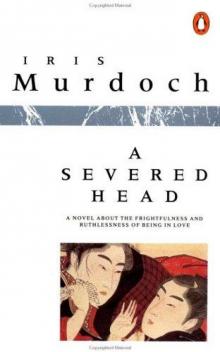 A Severed Head
A Severed Head The Black Prince
The Black Prince The Nice and the Good
The Nice and the Good The Unicorn
The Unicorn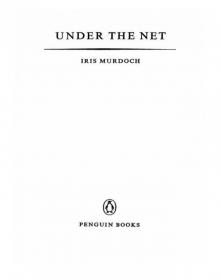 Under the Net
Under the Net The Italian Girl
The Italian Girl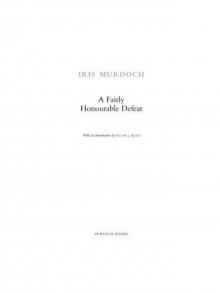 A Fairly Honourable Defeat
A Fairly Honourable Defeat An Accidental Man
An Accidental Man A Word Child
A Word Child The Philosopher's Pupil
The Philosopher's Pupil The Book and the Brotherhood
The Book and the Brotherhood The Good Apprentice
The Good Apprentice The Sacred and Profane Love Machine
The Sacred and Profane Love Machine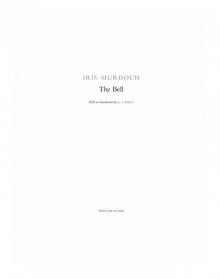 The Bell
The Bell Henry and Cato
Henry and Cato Metaphysics as a Guide to Morals
Metaphysics as a Guide to Morals The Time of the Angels
The Time of the Angels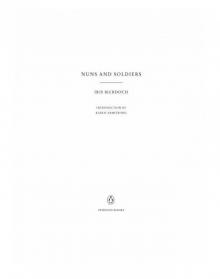 Nuns and Soldiers
Nuns and Soldiers The Green Knight
The Green Knight The Sea, the Sea
The Sea, the Sea Sartre: Romantic Rationalist
Sartre: Romantic Rationalist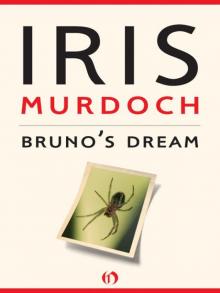 Bruno's Dream
Bruno's Dream An Unofficial rose
An Unofficial rose Sartre
Sartre The Red and The Green
The Red and The Green